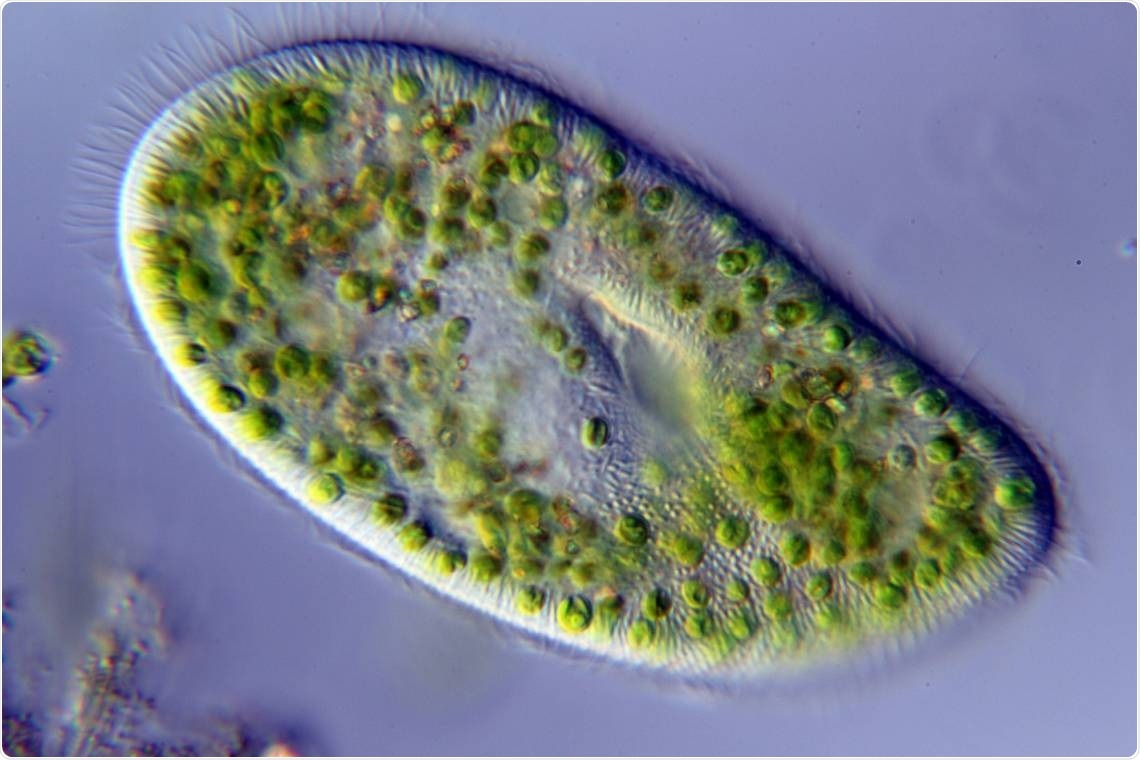The impact of climate change on Earth’s interconnected and interdependent webs of life is unpredictable. However, a group of scientists from Duke University remark that it is possible to get a glimpse of the future from a few ounces of microbial soup.

No wider than a strand of hair, unicellular protists like this Paramecium bursaria could keep greenhouse gases out of the atmosphere by gobbling up bacteria that emit CO2, researchers say. Image Credit: Anatoly Mikhaltsov, Wikimedia Commons.
Each teaspoon of soil and each drop of pond water is swarming with many tiny unicellular creatures named protists. They are plentiful and are estimated to weigh twice as much as all the animals on Earth combined.
There are over 200,000 known species of protists and are often overlooked. They are neither plants nor animals nor fungi. According to Jean Philippe Gibert, an assistant professor of biology at Duke, as the temperatures increase, protists play a major role in buffering the effects of climate change.
This is because of what protists like to consume. They devour bacteria, which release carbon dioxide into the air when they respire, similar to what humans do when they breathe out. As bacteria account for the majority of Earth’s biomass than any other living thing other than plants, they are one of the largest natural emitters of carbon dioxide—the greenhouse gas responsible for global warming.
Gibert, postdoctoral researcher Dan Wieczynski, and coworkers examined the effects of warming on bacteria-eating protists by developing mini-ecosystems. They used glass flasks each containing 10 various species of protists going on eating, competing, reproducing. The research was published on October 19th, 2021, in the Proceedings of the National Academy of Sciences journal.
The flasks were incubated at five temperatures ranging from 60 °F–95 °F. After two weeks, the scientists examined to find the species that survived at each temperature and measured the amount of CO2 given off during respiration.
To me, the question was a simple one in nature. Is there something to be measured on living organisms, today, that may allow us to predict their response to increasing temperature, tomorrow?”
Jean Philippe Gibert, Assistant Professor, Biology, Duke University
The result was positive. The scientists were excited to discover that each species’ response to temperature can be predicted from a few simple measurements of their shape, size, and cell contents. These factors together influenced respiration rates for the overall community.
The researchers also identified that by getting measurements like cell size and shape and plugging them into a mathematical model, they can get very close to how things played out in the mini-ecosystems in reality.
We can actually use what we know about the relationship between traits and temperature responses at the species level, and scale it all the way up to a whole ecosystem level.”
Dan Wieczynski, Postdoctoral Researcher, Duke University
The current research is crucial as it provides insight on “how climate change will alter microbial communities and how this will feedback to influence the pace of climate change,” says Wieczynski.
Source:
Journal reference:
Wieczynski, D. J., et al. (2021) Linking species traits and demography to explain complex temperature responses across levels of organization. Proceedings of the National Academy of Sciences. doi.org/10.1073/pnas.2104863118.